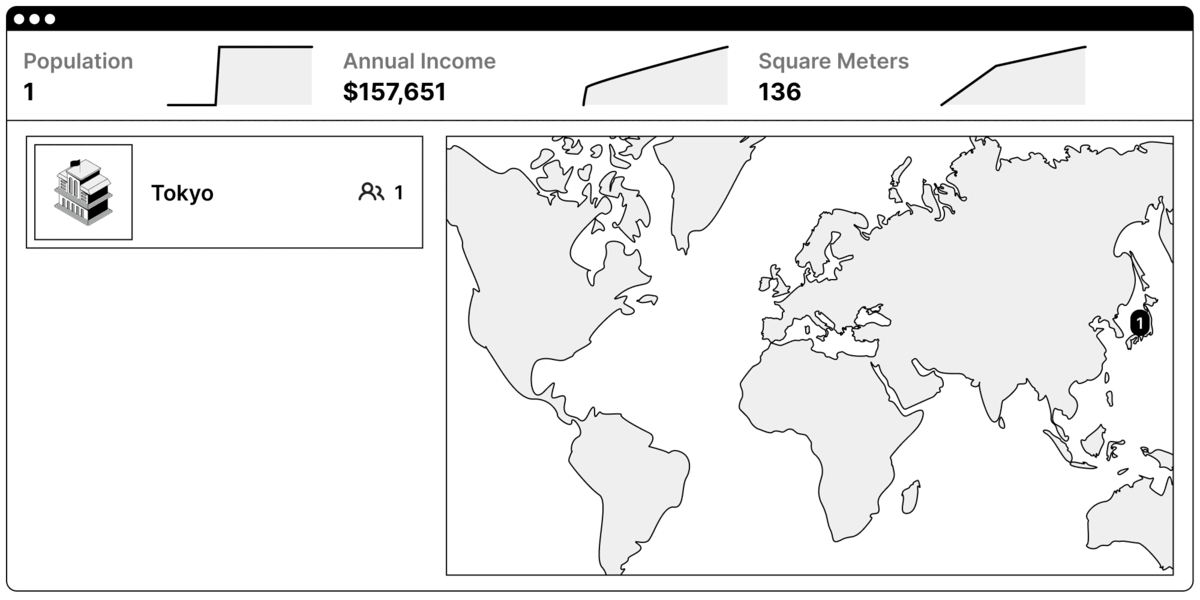The Evolution of the Nation-State

Will Nation States be replaced by, or coexist with other models such as Network States? Decentralized tech is driving an evolution in governance, offering new models for organizing priorities and coordinating resources. The secrets for making these new ways successful are older than we might think.
The Future of the Nation-State
Concerns over the continued viability of current nation-states have been emerging for some time now. This 2018 Guardian piece summarized trends that were clear then: "For increasing numbers of people, our nations and the system of which they are a part now appear unable to offer a plausible, viable future." The piece noted that more and more of the world's populations including the politically polarized population of the United States now live in countries that "that appear whole only on maps."
The erosion of geography-based governance
For our known history, governance has usually been tied to physical locations ("jurisdictions") with ownership claims, boundaries, and laws that applied within those boundaries.
In today's digital world, the geographic location of a citizen is no longer the only arbiter of the person's culture, well-being and financial security. Technologies like crypto and Zoom let us work and move funds without regard for international boundaries. Today's tech-enabled firms already operate like digital meta-states and likely presage the emergence of a new kind of tech-enabled state that is more inclusive and accessible than the exclusive offshoring options that wealthy multinationals take advantage of.
Sidebar: for a mildly entertaining tour of the offshoring world see the 2019 film The Laundromat a dramatic comedy based on the Panama Papers leak.
The crypto enthusiast in me says "yes this is where DAOs come in" but I also realize that getting the design right will take some time (and experimentation) to learn what features and structures are required to make a truly sustainable borderless nation based on blockchain technology.
Some have followed this "demise of nation-states" line of thinking to the conclusion that nation-states will become what Benedict Macon-Cooney calls "network states" - digital nodes in a (blockchain or chain of chains?) network of public and private platforms that enable a global direct democracy.
It would start as experimental sandboxes and progress toward maturity much the same way that software platforms mature as they release new versions. And Macon-Cooney astutely observes the competitive aspect of this - with examples like Estonia's e-residency program that offers access to the EU market without the need for a physical residence in the country.
This transition will make for some weird moments. Like Putin's bizairre economics lecture at the "St. Petersburg International Economic Forum" - delayed an hour by cyberattacks - where he peddled his version of a post-dollar global economy. Pure propaganda, but whoever wrote this crap is definitely reading the room. Around the world individuals and developing nations alike are watching for opportunities to be part of a more equitable financial ecosystem.
The rise of Network States
Balaji Srinivasan published a fascinating book The Network State which you can read online here or order a physical copy here. The GIF image above shows how a network state would develop.

In the book, Srinivasan assembles a set of converging trends (tech, social, geopolitical) into a logical end point where people who are tired of political gridlock, tradfi, and delayed action on equality, climate etc basically opt out to design and build a new kind of nation state - the Network State.
A Network State functions as a "highly aligned online community...that crowdfunds territory around the world and eventually gains diplomatic recognition from pre-existing states." (At a minimum check out the 1,000 word summary here.)
The network state has advantages over the geography based states because it does not require contiguous plots of geography to exist. Instead it is comprised of blocks of land or property that can be exchanged for other properties or if necessary converted and held as digital assets. If the policies, pollution, gun crime, school scores of a specific region aren't satisfactory, then the network state dumps those properties and buys others elsewhere. In addition, the net worth of a network nation does not face the same limitations or challenges as that of a traditional nation state. In theory this forces incumbent nation states to compete to host properties/investments of the network states.
The Aging American experiment
The original recipe for success, summarized nicely below by George Washington in 1783, has been easier said than done - especially point #4.
"There are four things which I humbly conceive are essential to the well being of the United States as an independent power:
- An indissoluble union of the states under one federal head.
- A sacred regard to public justice.
- The adoption of a proper peace establishment.
- The prevalence of that pacific and friendly disposition among the people of the United States which will induce them to forget their local prejudices and policies to make those mutual concessions which are requisite to the general prosperity, and in some instances to sacrifice their individual advantages to the interests of the community."
George Washington - June 8 1783.
In my thinking, these four points - especially the last one - is still the secret for making the new innovations successful over the long term. In our current phase of history, those with centralized power have done precisely the opposite of #4 - accumulating advantage at great expense to the community.
This is what is driving the restless search for better options and specifically the shift toward decentralization and the blockchain technologies that enable it. Decentralization represents a way to end the wealth and data hoarding behaviors of today's centralized incumbents. Key point: Decentralization is not really about avoiding accountability. Its about ensuring that no centralized player gains a unique ability to hoard wealth and data while avoiding accountability itself.
3 options available when org structures fail
When established org structures - whether companies, nations, or others - fail to meet the expectations of the people they are intended to serve, those people intuitively look for better options.
Albert O. Hirschman's 1970's essay Exit, Voice and Loyalty offers an especially relevant framework for understanding the evolving expectations and needs of customers, employees and citizens (see HBR's helpful explainer here). When organizations (companies, employers, nations) begin to disappoint, Hirschman observed that people have roughly 3 options:
- Exit - quit shopping at the store, resign from the company, emigrate or secede from the nation.
- Voice - communicate the complaints (leave a negative review, lodge a complaint with HR, organize a protest) in hopes of influencing a resolution.
- Loyalty - stay with the organization and try to drive change or improvements from within.
How organizations respond to their customers, employees or citizens impacts which options are used. Unfortunately, many citizens are being pushed toward the Exit option, because of the behaviors of those who govern. Sadly in the US, political gridlock and polarization may also be pushing portions of the citizenry to think about other options.
I think about these issues from 2 perspectives:
- A descendant - I have ancestors who fought in the Revolutionary War. When I look at their documentation and read their stories, I feel a deep sense of responsibility to preserve and carry forward what they fought for.
- A change leader - I have been blessed to witness and be part of waves of technology driven change, which gives me a cautious optimism about how things can be made better.
My hope is that we can pre-empt destructive pathways like secessions and find ways to make the American experiment increase in its equity, goodness and prosperity for all. I believe that emerging technologies like web3 and crypto can give us better building blocks for building a better more equity-driven society. One that avoids the kinds of financial inequities that breed extremism. It all depends on whether we can keep George Washington's advice (above) top of mind in our work and relationships.
Potential Future Paths
So where might this go? Put your imagination in hyperdrive for a moment - a few potential developments, offered without judgement:
- A DAO offers citizenship to a new alternative virtual nation-state effective at birth or via qualifying admissions process.
- Each citizen is owner of their own data and funds, held in a digital wallet, and has full control over sharing and using their data and funds.
- Each citizen is protected by “Guardian Angels(TM)” - robot drones that follow and swarm to protect citizens from any danger no matter where they are in the world.
- The DAO establishes Capitalism 2.0 a new economy based on complete valuation vs. the selective and flawed valuations of Capitalism 1.0.
- This includes proper valuation of caring work and the capabilities of nature, which finally enables us to pay people to care for each other, for nature, and themselves rather than consuming and destroying things in order to “grow the economy”.
- Future history classes will describe Capitalism 2.0 as a bumblebee economy: symbiotic relationship pollinating flowers with positive by products (analogous to honey, sustaining greater food supply etc). Capitalism 1.0 will be remembered as a termite economy (eat the structure you live in until it collapses).
Lots of potential benefits and bugs/problems in these thought patterns. But this represents some lines of thinking that a broad set of innovators are intuitively converging on.
Ones to Watch
- Citizen DAO is a new decentralized organization focused on connecting people and money to work on moonshot projects in categories of Health, Housing, Education, Energy, Finance and Governance. The organization hopes to be able to support humanitarian missions and serve as a "Citizenship for the Metaverse."
